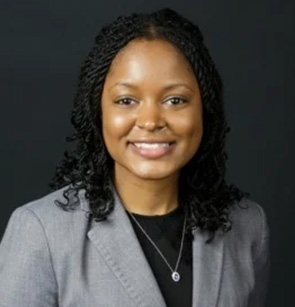Alisa Stephens Shields, PhD serves as an Associate Professor in the Biostatistics division of the Department of Biostatistics, Epidemiology and Informatics, and is recognized for her collaboration and impactful leadership in the realms of health, statistical education, and inclusion in the field. Prior to joining the DBEI’s faculty community, Dr. Stephens Shields earned a BS in Mathematics from the University of Maryland (2006), and AM (2009) and PhD (2012) degrees in Biostatistics from Harvard University, where she also serves as an adjunct professor.
Dr. Stephens Shields’ research focuses on extensions and innovative applications of causal inference approaches to enhance the design and analysis of clinical trials. She also works in the development of patient-reported outcomes to inform population-appropriate trial endpoints. She provides statistical leadership to clinical trials and observational studies in numerous clinical areas, including pediatrics, chronic pain, urology, and infectious disease. In this Community Spotlight, Dr. Stephens Shields touches on her experiences in the department and the field of Biostatistics.
Can you tell us about your current research and what inspired you to pursue this area?
Broadly, I’m interested in improving the design and analysis of randomized clinical trials (RCTs), particularly those with clustered designs or for complex, heterogenous diseases. This has included patient-reported outcome development, as well as approaches to enhance generalizability. My work with the Multidisciplinary Approach to the Study of Chronic Pelvic Pain research network opened my eyes to the challenges of conducting clinical trials for highly heterogenous conditions, and my background in casual inference heightens my awareness of sources of bias and variability in RCTs that can be mitigated.
How does your work in Biostatistics intersect with real-world challenges?
I often see the relevance of my work in non-research settings, from popular media coverage of conditions I have worked on like testosterone deficiency in aging men, or my personal experience with loved ones being among underrepresented populations in cancer clinical trials. I love that our work as biostatisticians is always motivated by a real-world problem.
What do you find most rewarding about working in the Department of Biostatistics, Epidemiology, and Informatics?
I’m thrilled by tackling messy, important problems with my colleagues and very much enjoy the process of going from feeling completely lost and confused when introduced to a new research question to navigating its nuances, identifying and executing appropriate methodology, and drawing conclusions. I find my colleagues and the overall research environment at the DBEI very inspiring. Researchers are empowered to dream big and pursue what initially appears impossible, but little by little, those big dreams become reality.
Can you share a significant recent project, publication, or professional recognition that you are particularly proud of contributing to or achieving?
I’m incredibly excited to be named this year’s Myrto Lefkopoulou Distinguished Lecturer. As an alum of the awarding Department of Biostatistics at the Harvard T.H. Chan School of Public Health, I can recall the awe and inspiration I felt in attending this lecture. I presented recent work in behavioral economics-informed strategies to enhance diversity in clinical trials, which emerged from my prior work with the Randomized Evaluation of Trial Acceptability by INcentive (RETAIN) trial of financial incentives to increase enrollment in RCTs. In RETAIN, I was proud of contributing novel insights into underappreciated challenges with the study design, and in our current trial, I found it very rewarding to figure out a new study design.
What advice would you give to students or early-career professionals in your field?
Find good mentors and use them. Meet with them regularly and ask specific questions. Until I was promoted, I connected with my mentors monthly, and we would review specific areas on my CV and strategize for how to improve them, which was really essential in maintaining momentum. I also cautiously recommend saying yes more often than not since every new experience is a learning opportunity, but I underscore that with the importance of checking in with your mentor. My mentors have also been helpful ‘No’ committees for opportunities that were not consistent with my goals.
What is an interest or pastime that you enjoy outside of academia?
When I’m not rediscovering the world through my daughters’ eyes, I enjoy a good rom-com, live music and concerts, and connecting with friends. A recent cherished memory is seeing Usher at the Wells Fargo Center with my childhood best friend of 30 years. In my more active seasons of life, I have taken various forms of dance classes, including Salsa and Zumba.
